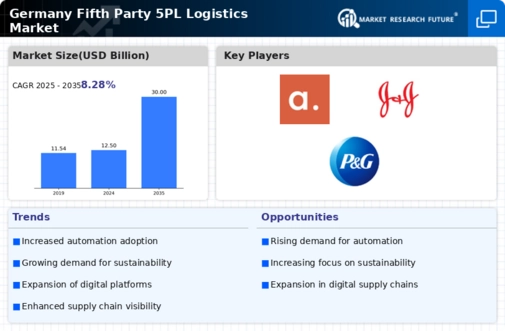E-commerce Growth
The rapid expansion of the e-commerce sector in Germany is a pivotal driver for the Germany Fifth Party Logistics Market. As online shopping continues to gain traction, logistics providers are increasingly required to adapt their services to meet the demands of consumers. In 2025, e-commerce sales in Germany reached approximately 100 billion euros, indicating a robust market that necessitates efficient logistics solutions. This growth compels fifth party logistics providers to enhance their capabilities in order fulfillment, last-mile delivery, and inventory management. The increasing consumer expectation for faster delivery times further emphasizes the need for innovative logistics strategies. Consequently, the germany fifth party logistics market is likely to experience heightened demand as businesses seek to optimize their supply chains to cater to the evolving e-commerce landscape.
Regulatory Support
Regulatory support from the German government is a significant driver for the Germany Fifth Party Logistics Market. The government has implemented various policies aimed at promoting logistics efficiency and sustainability. For example, initiatives to improve infrastructure, such as the expansion of transportation networks and investment in digitalization, are crucial for enhancing logistics operations. Additionally, regulations that encourage the adoption of green logistics practices are becoming more prevalent, aligning with the European Union's sustainability goals. This regulatory environment fosters innovation and investment in the logistics sector, thereby stimulating growth in the germany fifth party logistics market. As companies adapt to these regulations, they are likely to seek out fifth party logistics providers that can help them navigate compliance while optimizing their supply chains.
Technological Advancements
Technological advancements play a crucial role in shaping the Germany Fifth Party Logistics Market. The integration of advanced technologies such as artificial intelligence, big data analytics, and the Internet of Things (IoT) is transforming logistics operations. These technologies enable logistics providers to enhance operational efficiency, improve visibility, and streamline processes. For instance, the use of AI-driven algorithms can optimize route planning, reducing transportation costs and delivery times. Moreover, the implementation of IoT devices allows for real-time tracking of shipments, enhancing transparency and customer satisfaction. As companies increasingly adopt these technologies, the germany fifth party logistics market is poised for significant growth, as businesses seek to leverage these innovations to gain a competitive edge.
Global Supply Chain Integration
The integration of The Germany Fifth Party Logistics Market. As businesses expand their operations internationally, the need for seamless logistics solutions becomes paramount. This trend is particularly evident in sectors such as automotive and manufacturing, where German companies are increasingly sourcing materials and components from global suppliers. Fifth party logistics providers are well-positioned to facilitate this integration by offering comprehensive services that encompass international shipping, customs clearance, and warehousing. The ability to navigate complex The germany fifth party logistics market. Consequently, the germany fifth party logistics market is likely to benefit from the growing demand for integrated logistics solutions that support international trade.
Consumer Demand for Customization
The increasing consumer demand for customized products and services is driving change in the Germany Fifth Party Logistics Market. As consumers seek personalized experiences, businesses are compelled to offer tailored solutions, which in turn requires more flexible logistics operations. This trend necessitates the implementation of advanced logistics strategies that can accommodate varying order sizes and delivery preferences. Companies are increasingly turning to fifth party logistics providers to manage these complexities, as they possess the expertise and resources to handle diverse customer requirements. The ability to efficiently manage customized orders can significantly enhance customer satisfaction and loyalty, making it a critical factor for success in the competitive landscape of the germany fifth party logistics market.













